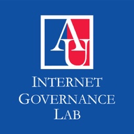On Friday, March 29 2019, IGL Faculty Director, Dr. Laura DeNardis delivered a talk at Michigan State University’s Quello Center on “The Internet in Everything, Emerging Frontiers of Cyber Policy.”
“Hidden Levers of IP Control” Panel at Global Congress on Intellectual Property and the Public Interest
Top level domains, algorithmic copyright enforcement, software licenses in hybrid goods, and anti-circumvention laws are all being weaponized to make expansive intellectual property claims. Internet governance scholars revealed these hidden levers of intellectual property control during a panel convened by the Internet Governance Lab at the Global Congress on Intellectual Property and the Public Interest held at the Washington College of Law on Friday, September 28, 2018.
Dr. Laura DeNardis Speaks at 2018 State of the Field Workshop on the Digital Transformation
Faculty Director Dr. Laura DeNardis is serving as a lead speaker and moderator at the 2018 State of the Field Workshop on the Digital Transformation hosted by the School of International and Public Affairs (SIPA) at Columbia University on June 15, 2018. She is moderating the panel “Platforms and Governance Issues in the Digital Age” and is serving as a lead speaker on the panel “Internet of Things and Governance in the Digital Age.”
Dr. Laura DeNardis Discusses Internet Governance on NPR Marketplace
Internet Governance Lab Faculty Director Dr. Laura DeNardis, Professor at AU's School of Communication, was interviewed by NPR Marketplace to discuss Internet governance in A not-so-secret war for control of the internet on May 4, 2018.
NetGov Lab Hosts Symposium on Governing the Internet of Things #IoTgov
The Internet Governance Lab at American University (AU) and the Washington, DC Chapter of the Internet Society (ISOC-DC) are co-hosting the symposium "Governing the Internet of Things" (#IoTgov) on Friday, March 30, 2018 from 9:30am-3:00pm in the Media Innovation Lab at the School of Communication McKinley Building on the AU campus.
Postdoctoral Fellow Dr. Andrew Rens on “Emerging Issues in the Internet of Things” at The Centre for Internet & Society
AU Internet Governance Lab Postdoctoral Fellow Dr. Andrew Rens gave a talk on “Emerging Issues in the Internet of Things” at the Centre for Internet & Society in Bengaluru, India on October 23, 2017. The talk was based on his research about the complex problems that are emerging around the proliferation of the Internet of Things (IoT), including ownership and control, privacy and surveillance, and ubiquity and network fragility.

